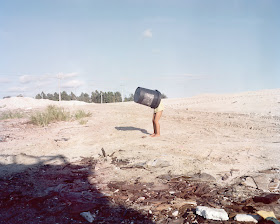Hi everyone!
Today photographer comes from China. With his series Coastline is on all the photography magazines!
His interview and his photographs offer us an inside perspective and a moment of reflection on China present changes.
- Can you tell us something about yourself?
I was born in 1981, Yantai city, Shandong province, China. 2005, graduated from Yantai University, Architecture. 2005.9-2009.6, work for Chongqing morning post as a photographer. Now is the freelance photographer, Work and live in Chengdu city Sichuan province, China.
I’ve been longing for the sea since my childhood, when my family lived in a village, about 40 kilometers from the nearest seaside. My family almost couldn’t afford for a travel to the seaside, and for a child, 40 kilometers was far far away. I’ve only been to the beach for a few times as a child, without remembering anything, but a mosaic blue whale on a wall at a shore. In 2005 I went to the city for university, a school near the sea, so I could see it every day lying on the bed in my dorm. I always sat alone on the shore, felling mysterious and unapproachable about the sea, and I knew my feeling had nothing to do with the fact that I couldn’t swim.
- How do you create your works?
I walk along the coast in China, One to two months for each trip. When I come to a place, usually I will buy a local map first. And then walk along the map all the day. I do not like to interfere with the characters in the picture, I like that they were naturally. I do not know what I want, but I know what I do not want.
- What would you like to communicate through your works to the spectator?
During these two years I walked by dozens of Chinese costal cities. Most of them led Chinese Reform and Opening, which started 30 years ago from the coast and one representative was the city Shenzhen. Thousands of people flooded into the city from their hometowns to let a small fishing village become a metropolis with millions of residents. There are miracles of rapidly growing economy here every day. We are not sure whether it is good or bad, as we made these miracles by losing our tradition and history.
In economic development many problems outbrave inevitably. The peasants who lost their lands were forced to work in costal cities, and then the house prices there rose so quickly that many citizens were impossible to have their own houses. The environmental pollution was astonishing. Many enterprises were threatening the residents here for economic benefits at the cost of offspring’s health.
During fast urbanization people’s spiritual life is stagnated. The strong conflict is hidden in peaceful life. The rich images express absurdity in conventional things, like a surrealistic let-off. Most Chinese cities, specially small-medium ones, were similar in buildings and layouts, which was the result of losing history and culture. Being lack of sense of belonging, we have no idea about where to go and which to follow.
I really like the words by American photographer Diane Arbus, “I really believe there are things nobody would see if I didn’t photograph them.” What I shot were the commonest scenes in contemporary China we were apathetic to see them and ignore them.
- What is, today, the role of Photography for you?
Now, Photography is my life.
For further information see also http://www.zhangxiaophoto.com/.
All the images posted here are Zhang Xiao’s works from the series Coastline.








No comments:
Post a Comment